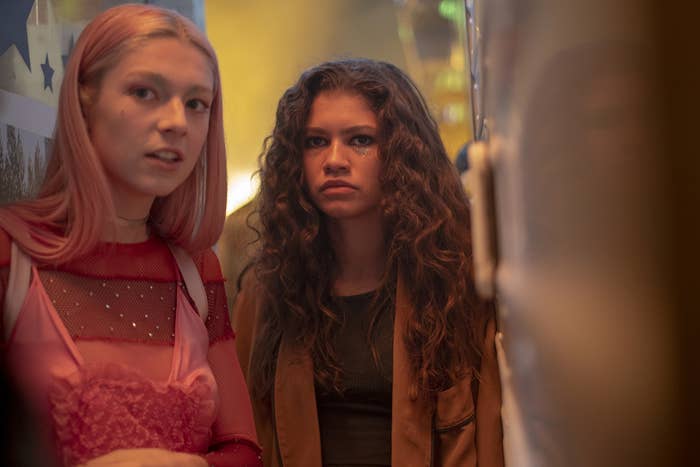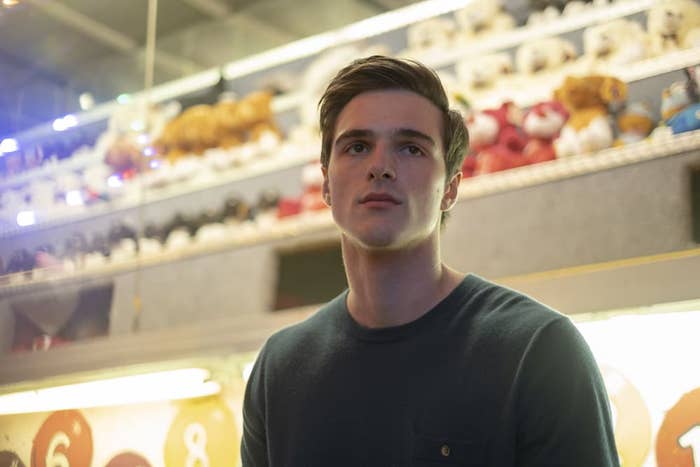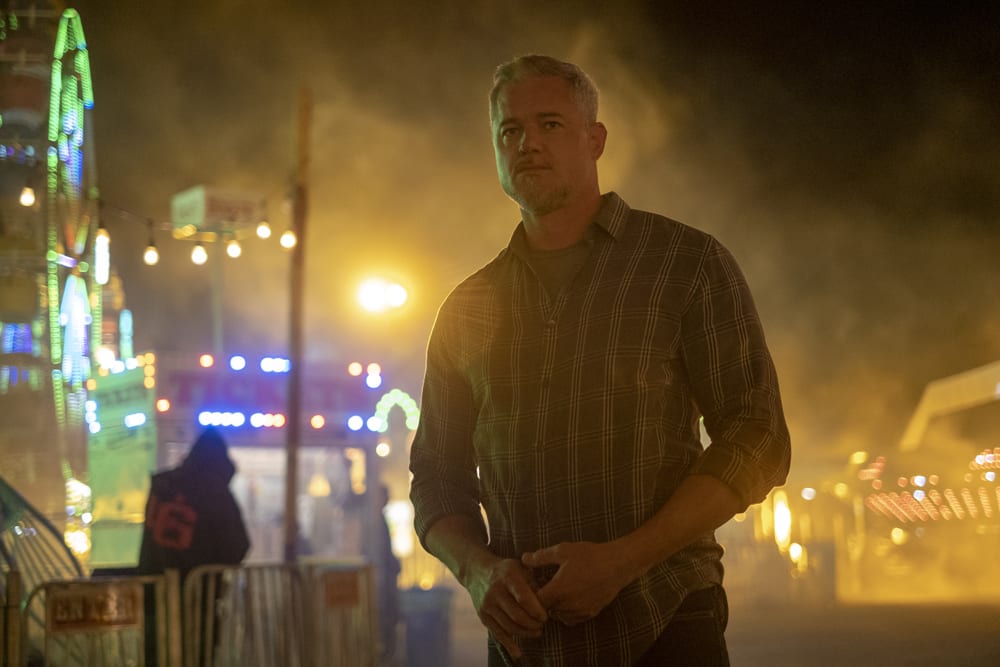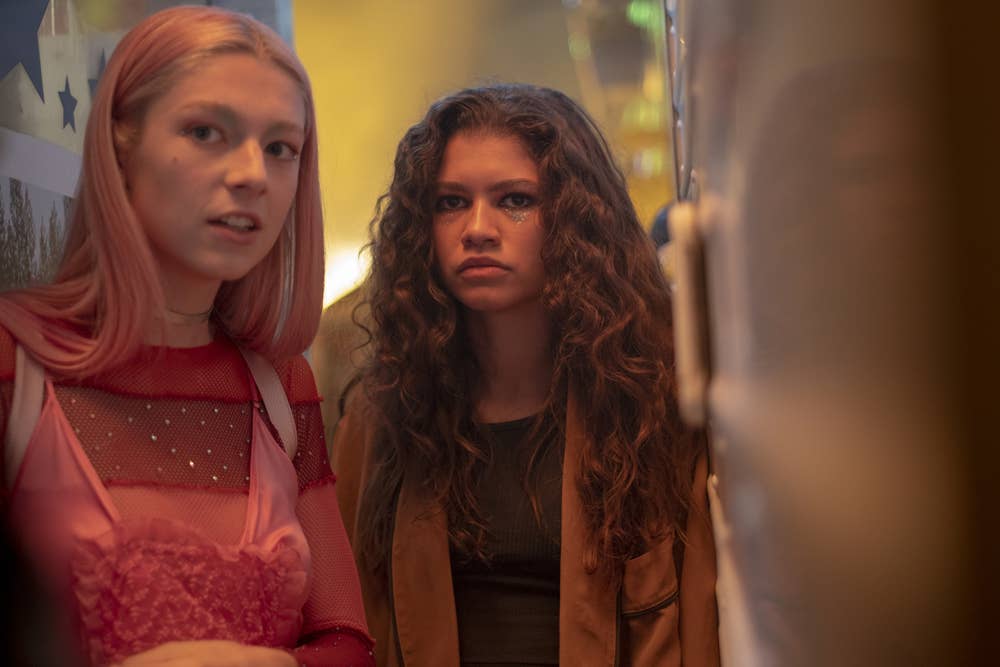
[Ed Note: Spoilers for tonight's episode of Euphoria are below.]
Almost fifteen minutes into tonight’s episode of Euphoria (titled “Shook Ones Pt. II” as all episodes have, somewhat lamely, shared titles with classic '90s-aughts rap songs) the action plops us down in the middle of a town fair wherein a bravura tracking shot establishes 11 of the 12 series regulars (sorry, Rue’s mom) in the perimeter, with all of their respective storylines primed to crescendo. After days of avoiding her, Rue will inevitably have to face Jules after potentially jeopardizing their relationship with last week’s ill-timed kiss. McKay and Cassie’s intensifying relationship will face its first public test. Kat’s burgeoning sexual awakening continues to bump against a more straightforward romance with the probably-prude guy from school. Nate and Maddy are back together, but that calls for her to re-meet his judgmental parents, including his dad Cal, lording over the same carnival as Jules with whom he had one of many illicit one-night stands with in the pilot. And she’s now unknowingly in a romantic correspondence with his son. Instead of a routine carnival night out, the fair serves as Euphoria’s plot pressure cooker. It’s a lot—everything on this show is a lot—but it’s exciting.
The best teen shows don’t just build characters, they build universes. Veronica Mars’ fictional SoCal town of Neptune, for example, felt like a fully lived-in universe let alone high school, down to the recurring background faces. In Euphoria’s first three episodes, I’d worried that creator-writer Sam Levinson and co. were mistaking quantity for world-building, throwing a good half-dozen parallel storylines at the wall with no clear narrative cohesion.

“Shook Ones Pt. II” assuages all that with an episode that assembles virtually every character in one central location for the first time since McKay’s party in the pilot. It’s an hour that never lets up in tension, with no glaring weak links (Addendum: I still can’t get a read on Maude Apatow as Rue’s waning best friend Lexi). Even Gia following in big sister Rue’s drug experimenting footsteps holds weight for showing Rue the wider consequences of her actions, and because McKay’s twin brothers are delightfully evil little shits. It’s only episode 4 but every plot development feels majorly significant, lent operatic weight—Rue and Jules’ embrace, Cassie embarrassing herself on the carousel—by the increasingly frenetic carnival score and swooping camerawork. After all, isn’t treating banal encounters as either life-affirming or end-of-the-world the whole point of being a teenager? In episode 4, the show’s already masterful visual flair and the flailing narrative finally leveled out and merged into something harmonious that showed real potential of where it can go from here. It’s crazy that, after just four episodes—and technically only one where Rue’s true feelings were clear—Rue and Jules’ first kiss was successfully presented as some grand moment the show’s been building to forever.
But Euphoria’s other big issue is tone. Debates over exploitation and shock value for shock’s sake have swirled since before the pilot even aired, inevitably. Beyond that, though, it’s still unclear exactly what type of series it wants to be. There’s an inherent hedonism and cynicism, which is par for the course in this genre, but there’s also a dark edge that’s been seeping in and spreading, a blood red wine stain slowly dominating an already sullied carpet. It started in episode 2, when a dealer that felt imported in from Breaking Bad forced fentanyl on Rue while threatening to do worse—pick a scenario, any was possible. That happened alongside closeted rage machine Nate transforming into Patrick Bateman, going so far as to shower and change in the apartment of the poor guy he just beat to a pulp. A Gen Z’r careful not to leave a trace of DNA? Is this show the next Skins or the next Riverdale?

The identity crisis deepens in episode 4, wherein it seemed as if Jules might get murdered at not one but two different points throughout the 55-minute runtime. First, her wandering the fair alone is ominously intercut with Cal looking for her. By that point, his obsessions with public image and perception have been so thoroughly established—and always with an undercurrent of menace perfectly played by Eric Dane—it’s fully reasonable to assume he’d resort to murder to protect them (remember during his and Jules encounter she lied about not living in town). When Cal does catch her, it’s in a secluded area, with fireworks and all kinds of noise giving him the perfect cover to attack. Instead, he pivots to grace and humility, but it’s crazy that that’s the twist and homicide seemed like the most obvious outcome.
Several scenes later is more of the same, as Jules nighttime bike ride to meet “Tyler” is practically filmed like Red Riding Hood heading towards certain danger in the woods, and their actual meetup is lit like a slasher film. This piece was filed before the episode aired thanks to advance screeners, so hopefully, a post-show interview somewhere will clarify whether Nate always knew about his dad and Jules or if he put it together when she confronted Cal at the family booth. Either way, this scene is, quite plainly, kind of ridiculous. Nate is at once a compelling basket of contradictions and Euphoria’s worst character. Closeted dad, rage issues, negotiating his own sexuality and the defense mechanisms he’s erected because of this: those could make for a great, complex character. But Levinson sets Nate two steps back when he fashions him into a supervillain. This show has a cast full of kids who weirdly toss off the finer points of California child pornography laws as if that’s something teens just know off top. It seems forced, and in Nate’s case, he’s starting to become diabolical beyond belief. A complicated internet frame-job hanging over Jules is better than a dead Jules, though. Once Rue started sending texts that Jules couldn’t read about enjoying the night, every melodrama-thriller I’ve ever seen before pinged off in my head and I was absolutely sure Jules was done for and her murder would be used to power the remainder of Rue’s Season 1 arc.
That could’ve been compelling in its own right, but it also would’ve transformed Euphoria into a different show. This is absolutely the type of series that will engineer a big character death either in the atypical HBO-penultimate episode twist or in the finale. That’s fine. Random killings mid-season seems a bit much. But it’s clear the episode was crafted to at least make us wonder if a twist that dark was really on the table. As Season 1 continues on, Euphoria will (hopefully) continue to nail down its tone and deliver moments that will reflexively define the show. It’s the rare series that comes out of the gate fully-formed and knowing itself. And despite the ongoing identity crisis, “Shook Ones Pt. II” is Euphoria’s strongest, most promising episode to date—Rue and Jules’ first kiss might be pantheon-worthy. Now that the screener well’s dried up, I’m more eager to see where this all goes than ever.

